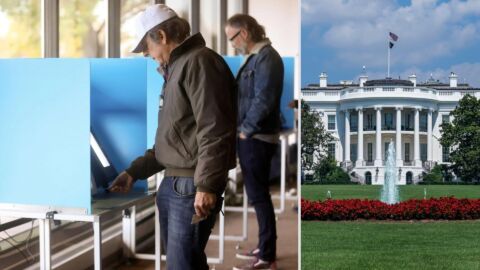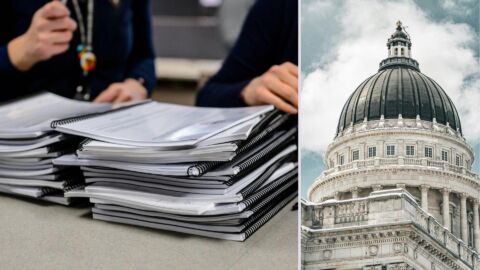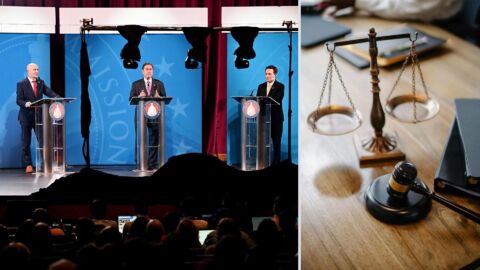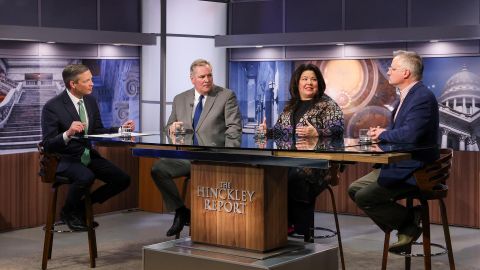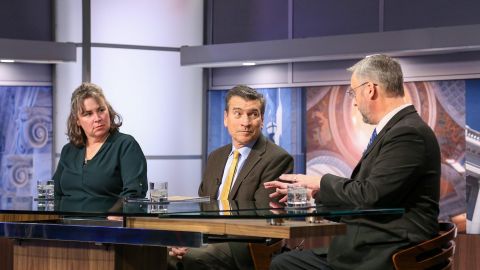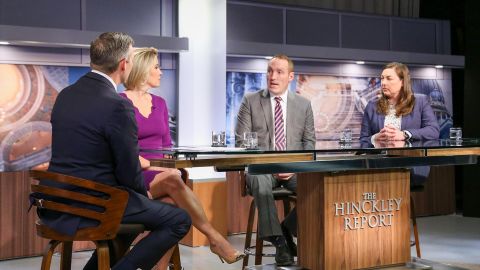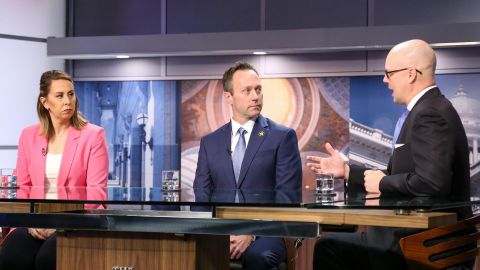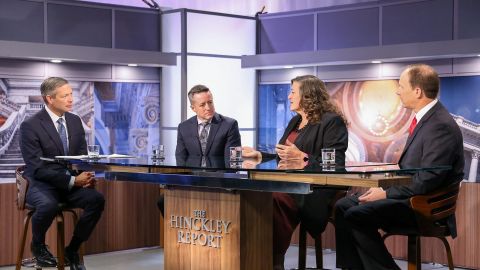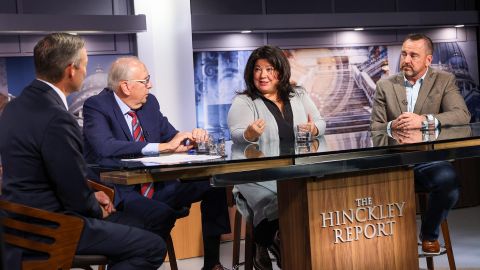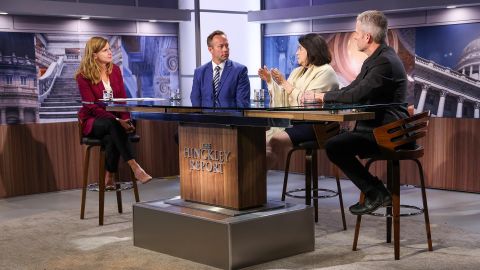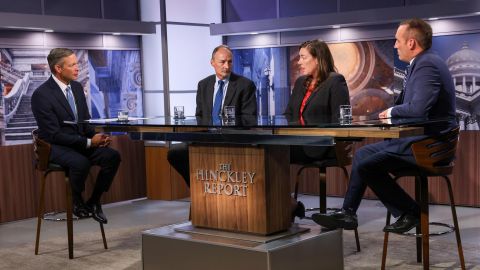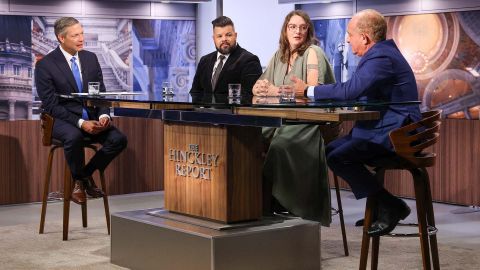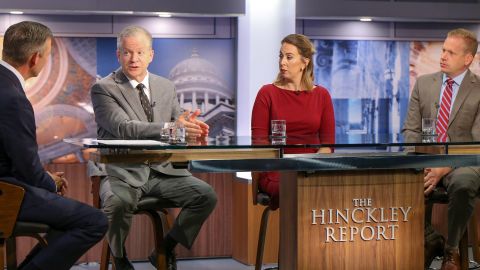♪♪♪ male announcer: Funding for "The Hinckley Report" is made possible in part by Merit Medical and by contributions to PBS Utah from viewers like you.
Thank you.
Jason Perry: Tonight on "The Hinckley Report."
With November 5th just around the corner, county clerks prepare for a historic election, prominent leaders reveal who they will and won't be voting for, and candidates make a final push to reach undecided voters.
♪♪♪ ♪♪♪ Jason: Good evening and welcome to "The Hinckley Report."
I'm Jason Perry, director of the Hinckley Institute of Politics.
Covering the week we have Doug Wilks, executive editor of The Deseret News; Becki Wright, founder and CEO of Proximity; and Jeff Parrott, state watch editor of The Salt Lake Tribune.
So glad to be with you all this evening, a lot happening in the political world.
But this is one of those discussions where we have the court connected to the political world as well.
And Doug, I'm gonna start with you on this one right here.
It was a tough week for amendments, been a couple of tough week for amendments.
Talk about what happened first when it comes to Amendment A this week.
Doug Wilks: Well, Amendment A was looking at whether the Constitution could be changed to have taxes totally earmarked to education, which has been a part of that for quite a while.
But the court said that the rules were not followed and so that those votes will not be counted, which is similar to what happened with Amendment D-- that has to do with posting transparency of--in the newspapers and also some of the language that was in the description for voters.
Jason: Right, so, Becki, this is interesting because the court has weighed in a couple of times now on these amendments and these two parts break down these--what Doug--these points that Doug just mentioned.
One was this publication issue has to be published for two months in a statewide newspaper.
That seems to be a problem with Amendment A and Amendment D. And the second one came to the clarity of the language of the amendments themselves.
Becki Wright: Yeah, so voters are looking at the ballot and they're not going to the actual language of the bill.
They're not gonna go and read everything we--well, some voters could potentially, but we're expecting them to look at the description and have it match what is actually in the bill.
So, the argument was that the description of the bill and the actual bill were not congruent.
So having that dis-match, this match--mismatch between the two actually is a problem when you're trying to convince people whether or not they want to vote for something.
And then also like was explained, they have to have a certain number of time where it's publicly available for the--for those voters to look and see where the information is that they can gather more information, how they can learn more.
And if that's not published in the paper that doesn't follow the rules that are required.
Jason: Talk about these amendments for just a second, Jeff, because we're really looking at what the future of them will be.
The future of amendments in the state of Utah.
Two off the ballot, I'll talk about two more that will be on the ballot that will count.
Talk about where you see this going, particularly in light of these rulings.
Jeff Parrott: So, I wanna add to Becki's point about the ballot language.
There was a law passed just this past year that changed from the ballot--of language being written from a nonpartisan part of like the state government to the elected house speaker and the elected senate president, which makes inherently those, you know, potentially partisan language or at least in favorable language compared to what those two elected officials think.
As we get back to the other amendments, there are still two that are left on the ballot, Amendment B and Amendment C. Amendment B would add 1% from the trust lands to education funding and Amendment C, which I didn't even know wasn't already in the constitution because it's a state law, would ensure that each county elects a sheriff every four years.
Jason: Doug, talk about this publication idea a little bit too.
I mean, you're a paper, both of you are part of these statewide newspapers, but this has been part of the discussion as to whether or not, you know, this is really the right format here.
Is the statewide paper enough to give notice?
Doug: There's a big picture point of view here which is transparency and there's been issues of transparency with what the legislature is doing, which has driven a lot of this.
Okay, do people feel represented being able to talk to the legislature?
Do the processes make sense?
So, the processes about publication, that's something worthy to be discussed.
Do you need to publicly publish in a print edition or can you do something, you know, digitally?
Obviously digital is the main focus of all newspapers right now.
So, that's something to pay attention to.
But the processes weren't followed here.
This won't go away.
All these things will come back and the processes will be adhered to or challenged.
The voters will have a chance to vote on these issues.
The voters will have a chance to vote on what to do with dollars for education.
They'll have a chance to vote on whether to change the constitution.
It's not strictly in big picture terms of, oh, the legislature is just doing a power grab.
That's not every legislature is trying to do that.
They don't wanna become California.
Well, that's a little bit of fear mongering, but quite literally, Utah has an incredible thing going with the economy, with the future, with growth this 10 year march toward the Olympics.
So, there are really strong, good issues at play that need to be discussed and debated.
But the problem here was that the rules weren't followed.
It was a rushed effort and it needs to be evaluated.
Becki: Well, and can I jump in there?
This is an important concept because transparency is vital for our legislative body and for all of those who are participating in putting something on the ballot.
But to get something on a ballot, a citizen's initiative to get on the ballot is extremely difficult in Utah.
So, even going through that process, we're expecting that whoever is putting an initiative on the ballot has to go through this quite extensive process.
We also have to expect that same of our legislative leaders.
Jason: Jeff, talk about where you think our legislature is going to go with this.
As you're talking with them, you're reporting, so they have some decisions to make just maybe some things about what they're going to do with the court.
But maybe also when it comes to this initiative process itself?
Jeff: First, we need to see if B and C are going to remain on the ballot.
They're absolutely one lawsuit away from being declared void themselves.
So, right now, lawsuits challenging the amendments are batting a thousand.
So, A has been declared void.
D was declared void earlier.
We're still waiting for longer, more nuanced explanations on what those rulings are, but they--those votes will not be counted.
So, you know, one long--one lawsuit away from no amendments being counted, which will mean, as Doug was saying, the lawmakers will go back to square one and, you know, re-evaluate how they're getting these amendments put back on the ballot.
Do they need to go through the process again?
Are there gonna be any tweaks?
You know, if there's been enough public outcry for, hey, we didn't like this part of the amendment.
Are they gonna change what the amendment will actually look like?
Is the ballot language gonna change?
As folks have complained that it's a little misleading or they think it's misleading.
And so, I think we've got, you know, two years, two legislative sessions and as many emergency sessions as the lawmakers want to now call to get this figured out in the next what, 20 months?
Jason: It's not much time.
One last question on this, Doug, because we had a lot of discussion from our legislature about the ruling on Amendment D and that has to do with the judicial process itself as we discussed.
Not so much of pushback on Amendment A when it comes to a further expansion of the use of the income tax funds.
Doug: Yeah, so you want me to interpret that?
I don't know if I can interpret that other than I think the legislative, look, we work with the speaker, you know, the president of the Senate, the Speaker of the House.
I don't think they're bad men.
I think they're good men.
I think they want to do what's right for the state.
Others might argue differently, but I've worked with them.
That's where they are.
I think this was a rushed process.
And so, I think they need to take a step back, make sure the law is what it is.
We've read, you know, the initial court decision to this 83 or 87.
I can't remember how many page decision, talking about the people do have a right to kind of alter how government works, meaning you can't just take that voice away.
That said we do need to have a representative government.
The legislature has to have the right to look at whether it's an amendment, a proposition, whatever it is.
They have to be able to tweak it because that's the kind of government we have.
So good government can happen here.
They just have to take a step back, do the right thing, and then the voters can vote on what it--what they have to do.
There's no real villains in this, in my opinion.
That's what I'm trying to say.
Jason: Yeah, we continue to watch this one closely.
Becki, I want to talk about what's happening this week.
Interesting, the ballots are going out.
We're gonna get on the 15th of this week.
We'll start getting ballots in the mail.
You're one who advises candidates across the state.
You're very involved in this.
Talk about sort of the process here for the candidates knowing that the ballots are going to start landing on people's--in their mailboxes and on their countertops.
Becki: Well, Jason, it is go time as you might have expected.
These last few weeks of the election are one of the most crucial times that candidates and campaigns can get their voices out, their voters engaged and out to the polls.
I don't care how much your aunt down the street really loves you.
If she doesn't show up to the polls, you're not going to get that vote, right?
So, they are--they're really pushing hard.
You're gonna see billboards, you're gonna see mailers, you're gonna see all kinds of media buys that are happening from candidates across the state who are really working to say, "Hey, don't forget, I'm running, vote for me."
Jason: How does this work through the media lens in this last month, Jeff?
Jeff: I think what we're looking at is the surrogates too.
You know, we saw Taylor Swift come out and endorse Kamala Harris here recently.
But I think it's more important where we're seeing like neighborhood, like people in your neighborhood, people that are your friends making endorsements.
We saw recently members of the LDS church either endorsing Kamala or endorsing Donald Trump.
And I, you know, Becki, you might have a better understanding of this, but I do think those endorsements from our friends, from our neighbors, who we go to church with, who we see at the bar are probably a lot more important than Taylor Swift who never is gonna know if we followed her endorsement or not.
Jason: Yeah, go ahead, Becki.
Becki: It's actually really interesting concept because we do tend to weigh the benefit of who we know higher than we would for just like a celebrity endorsement.
But what's happening with these most recent endorsements is they are a group of prominent LDS leaders who are, when you say it like that, they are clearly trying to target LDS voters.
They're trying to say, "Hey, we're like you.
We are LDS like you, this is what we believe."
And so, it's kind of a mix because it's an endorsement from or a lack of endorsement from a prominent leader who also is trying to create that connection with them.
Doug: There's not LDS leaders that's, I think that's not correct.
There are people who are Latter Day Saints who have made a name for themselves in whatever capacity they have.
But the LDS church even this week came out with a very strong statement of political neutrality.
So, people try to co-opt one side or the other.
What you have are people trying to get the Latter Day Saint vote in Arizona, particularly because it's a swing state.
So, that's why this is part of the conversation because of Arizona, certainly in Nevada as well and then elsewhere.
So, both the Harris campaign and the Trump campaign are looking toward that, but there's no formal leadership capacity.
Becki: And Doug, that's a really great, that's a really great point because that's what's happening is they are co-opting the name.
They're trying to make that connection.
It is definitely not approved by church leadership, but they're using LDS, you know, for Trump or LDS for Harris.
And that's the connection.
Jason: To continue this point, Jeff, since you brought it up.
So that was the actual name Latter Day Saints for Trump.
In 2020, you know, Arizona became a very important place for that particular part of the vote.
Talk about the strategy there because we even had JD Vance helping with a couple of these groups this past week trying to secure that vote.
Jeff: It's also not the first time we've seen this happen.
I mean, we're only four years out from Captain Moroni being compared to Donald Trump by Senator Mike Lee.
And so, I don't think this is anything new.
I don't think it's gonna be something that goes away.
How it impacts the election is yet to be determined and it's not gonna be November 5th, but December, January before we even figure out if it helped or not.
Doug: You know, your main point was what do we do now?
At Deseret News, we're trying very hard to show what is the Harris campaign trying to do?
What is the Trump campaign trying to do?
People know these candidates to some extent, less so with Harris perhaps than Donald Trump, but they've got big time surrogates, not just a celebrity endorsement, but you have Elon Musk on the one side now, all in trying to help Donald Trump and Barack Obama is now front and center almost more than Harris herself trying to get the vote for her.
So, yeah, this final month is going to be very interesting.
Jeff: Musk is interesting because I think he is wildly polarizing.
So, I think candidates, you know, have to make some amount of calculation on is the juice worth the squeeze here?
So, is bringing Elon Musk to jump happily on my stage in Butler, Pennsylvania.
Is that worth deterring voters that might find him, you know, less appealing than the candidate already.
Doug: Fired 80% of Twitter.
And if you think about the bloated government, if you think of $35 trillion in debt, you can be in a place where you say, "All right, put Donald Trump in there, let's have Elon Musk in there and let's see how many people are gonna lose their jobs."
The sort of blow up contingent, I think is alive and well in America right now.
Jeff: We've seen other, you know, other high ranking politicians, other big names in Utah, like Mitt Romney just this week saying that, you know, of course, he's not going to vote for Donald Trump.
He doesn't want Trump to be president.
You know, like his votes, you know, four years ago, made that pretty clear.
He's been outspoken for years now, but he also said he's not going to be endorsing Kamala Harris.
And again, he alluded that there's some calculation that he's made and then that we will also have to make on why he's making that decision.
Jason: Let's get into that for just a moment because Mitt Romney was here.
He's talking about his time in office.
He was at the Hinckley Institute of Politics this week with the project done with the Sutherland Institute.
And Becki, I want to show this graphic because it's interesting what Jeff just mentioned there about what Romney said about who he is endorsing or is not endorsing.
Kind of curious your take.
Let me read it really quick quickly to you.
This is what Senator Romney said.
"I've made it very clear that I don't want Donald Trump to be the next President of the United States and you're gonna have to do the very difficult calculation of what that would mean."
My guess is that you've done the calculation.
Becki: Well, the calculation is pretty clear, right?
He says it himself, "I'm not endorsing Donald Trump."
And as a number of other prominent leaders in our state, we heard from our Lieutenant Governor Deidre Henderson saying that she would not endorse him as well.
They're clearly saying we are not endorsing any one candidate.
You're going to have to take from that what you will.
Jeff: We've seen degrees of this too.
I think, you know, last night in the Senate debate or after the Senate debate, John Curtis was asked to clarify his position a little bit.
He was attacked from his right by an Independent American candidate who calls himself pro-Trump and said that Curtis is not pro-Trump.
Curtis has said that he won't endorse Trump, but that he will be voting for the Republican party's top of the ticket.
And so I, you know, the miniscule--or the hairs we're splitting when it comes to these endorsements I think it is very, very small.
Becki: Well, and he even said in his primary debate that he's willing to work with whoever he's--is going to be the nominee.
So, I think that's another way to look at it is Curtis has said I'm not going to formally endorse but I'm willing to work with and go forward with what happens.
Jason: I wanna stick with Romney for just a second and then I wanna get to that, that Senate race for just a moment.
What was interesting, Doug, is what he said in his speech here was that part of the reason, at least why he wasn't saying he was going to endorse Kamala Harris is that he wanted to, this was his quote, "To rebuild and reorient the Republican party."
He feels like he does that better by not endorsing, by staying connected to it.
Doug: Yeah, I mean, he has been consistent.
It started here at the University of Utah with the speech he made basically castigating Donald Trump before he became president of the United States, but he won the nomination.
His consistency has been both to his great benefit and also not, right?
It has been very costly politically in a lot of areas.
The consequence is if he doesn't want Donald Trump, he knows it'll be Kamala Harris.
If it is Kamala Harris, then what do you do to rebuild the Republican party?
You know, if Donald Trump wins the presidency, that'll have quite a few ramifications for Senator Lee.
Does he, you know, join a cabinet?
Does he become Attorney General?
He's certainly a key player for Republicans right now with him as president.
If it's Kamala Harris, does Romney become that Republican she puts in her cabinet, which she has promised to do?
Can he do that and then rebuild the party?
So, he's in an interesting place because he can take a step back as a senior statesman and maybe have influence, maybe not.
Jeff Flake can maybe have influence, maybe not.
So, we'll see what happens with the party as it relates to whoever wins.
Becki: Well, and I'd like to just talk, touch on that briefly.
Statesman and stateswomen, that's really what we are looking for in politics.
That's what we want as voters.
And what we've seen lately is what, you know, people term "anger-tainment" People are going and trying to just because of the short news clips or the structure of social media or whatever it is.
If we can get people angry enough, they will vote for me or they will give me small dollar donations and then I can spread my message even further.
But what we really need in America to rebuild America is stateswomen and statesmen.
Jeff: Sorry, Romney got to this in his speech this week, talking about how politics has turned into professional wrestling.
He had several other points and what he thinks some of his biggest concerns are in politics, but none of those are gonna be addressed until you know, the statesmen and the stateswomen, the statespeople, you know, stop fighting like professional wrestlers.
Jason: Explain how that happens because it was interesting.
He said, "Politics are pro wrestlers in disguise.
They wanna run for the office, but they have no intention of actually passing legislation," Jeff?
Jeff: So, man, I couldn't, I don't think I could say that any better than the Senator did.
Jason: Okay, Becki, talk about for just a moment what hangs in the balance because we have the senate race replacing Senator Romney will be one of these candidates here, John Curtis, Caroline Gleich, or Carlton Bowen.
They both debated this past week each other.
Talk about what is sort of hanging in the balance in terms of the state of Utah on the national stage.
Becki: Well, the thing that's really interesting about Utah is we have what's called the Utah way.
People see us as actually, even though we are, you know, quite heavily Republican, we have the ability to get things done, to work with each other.
And I think people in Utah want to see our congressional leaders, our senate leaders, to be held as a standard of the nation of statesmen and stateswomen who are standing up and saying we're willing to work with each other.
I know that Senator Romney really cared about that and I hope that whoever replaces him follows in his footsteps with saying, "Hey, let's talk, we're across the aisle, let's talk, let's come to an agreement and try to get something done."
Doug: Well, I was just going to say it's, I mean, to try and win a race, you have to carve out a position, right?
So, the Democratic candidate like she's, she's younger.
She says, "Look, it's time for a new generation in Washington."
She's trying to put that forward.
So, you look and say, does she have any kind of credibility or solutions to try and make that happen?
And then you weigh that.
Curtis is being painted as not Trump enough, which is why the Independent candidate and there he says, "I'm independent, but I'm here as, yeah, but I'm here as the pro-Trump candidate."
But Curtis has worked with the Republican party.
He's worked with Trump.
He has not have a full throated endorsement of Donald Trump, but he also votes with Trump when he says, quote, "It aligns with Utah's values."
So whoever wins that race and, you know, we don't handicap but whoever wins that race, it's not seen as--that it will turn Democrat or one other way.
I think nationally they believe Utah will be a reliably Republican candidate.
What happens around the rest of the country could be, will certainly will be as important as who's in the White House.
Do the Republicans or Democrats control the Senate and which party controls the House?
Because if you have a little bit of--if you--if it's one party controlling all three branches of government, then that's when wild swings happen.
But if you have some kind of checks and balances in there, even if the, the gears of government are slow, in my opinion that's probably better than lurching from Left to Right, every four years.
Jeff: Along those lines, I think there's an opportunity here for Utah.
I think this race is, you know, we've heard it characterized as the winner of this race is going to be more like a Mike Lee senator, more like a Mitt Romney senator.
And I think that dichotomy is too easy.
I think there's an opportunity here for whether it's Gleich or whether it's John Curtis to carve their own path and that will take time.
It's not going to be like a quick race.
The senators have six year terms.
He's going to have, you know, 12, 24 months to figure out like the senator, if it's Curtis, the senator he wants to be.
And I don't think that necessarily has to mean he's like Mitt Romney or John-- Doug: It was a rigorous primary, right?
Jason: Talk about the plan please Becki.
Becki: And really going back to Curtis, some of his key points he started the Conservative Climate Caucus which historically has been co-opted-- climate, has been co-opted by one side of the party.
And so, bringing that back and into the Conservative arena and saying, "Let's have a nuanced discussion about this."
That was one of the points that Romney actually brought up in his five kind of things that need to be addressed in America right now.
He talked about the pro wrestling.
He talked about climate, he talked about AI and all of what is happening there.
He talked about debt.
We really need to look at what's happening in Utah and the nation where we're going, how we're spending our money in government.
And the fifth one was, remind me.
Do we know what the fifth one was?
Doug: I can't remember what-- Jason: Those were the primary points, yeah.
Well, I want to talk about where Utah is going for just a minute in our closing couple of minutes about this.
This is kind of a big week in sports in the state of Utah.
Utah is changing.
We had our first game of our Utah hockey team.
We're officially called it the Utah Hockey Club for now.
Doug, talk about this for just a moment because Utah is changing, not just through hockey, which I know you love and have followed, but also with what's coming downtown.
Doug: Yes, as a Californian, I'm a true hockey fan.
I did watch the game last night.
The Utah Hockey Club is 2 and 0.
They play in Madison Square Garden next.
I mean, they're on the national stage, right?
It's a big time game.
Utah has remade itself many times and it's prepared to do it again.
And again, you have this excellent deadline of the 2034 Olympics.
You have Ryan Smith coming in and it's not just that they're trying to say, well, let's, you know, get the Delta Center.
It's that whole downtown between what they're doing and what others are doing, including the church redoing its, you know, Temple Square.
People are putting billions of dollars into Utah.
The Larry H. Miller group on the west side, traditionally ignored billions of dollars of investment going into that side of town.
And then Ryan Smith's group on the east side with the Delta Center toward Abravanel Hall, tons of investment going in.
So, this is an amazing opportunity for Utah to do what it can and they're smart people in Utah as its economy shows, you know, smart people behind it, Republican, Democrat, and otherwise.
Smart economists are behind it.
So, it's just step by step making the right decisions to improve and make this a an amazing place to live, which it already is.
Jason: But--Go ahead, Becki.
Becki: Well, I was gonna say it also is interesting to see this public-private partnership that's occurring.
So you've mentioned all these prominent leaders that are coming in and doing that.
Also, the city itself is looking at what do we do in that--the square block of this large, walkable area.
And I think that's what's really driving us forward.
I recently spoke with Frasier Bullock and Governor Cox about the Olympics and what is needed to be done.
Our facilities are top notch.
They're fantastic for 2034 coming ahead, but there's a lot more that we could be doing, especially in our downtown area to bring people in, to make it feel like a destination when those Olympics do come.
Jason: One more point on this, Jeff, if you'll comment on this because Salt Lake City did just approve 0.5% sales tax increase for what--to revitalize the District and the Delta Center renovation.
That is kind of a big vote with big implications.
Jeff: Absolutely, it's not, it is the people investing in this space, you know, whether they wanted to or not.
And so, it's not just investors with billions or millions of dollars to invest in downtown.
It's not just developers that are hoping they're going to build something and then see a return on the back.
It's folks like us who are going to spend our money downtown or certainly are going to be spending our tax dollars on hoping this works.
And I think we certainly saw an analogy of potential this week as the Delta Center sold its record amount of beer this weekend or this week at $15 Michelob--with $15, excuse me, with $15 Michelob Ultras.
And this whole election has, you know, hinged on the argument that the economy is either doing well or it's not doing well.
And if, you know, you want an example of why the economy might be doing better than politicians or pundits are telling us it's folks are willing to open up their pocketbooks for $15 cheap beer.
Jason: It's gonna have to be the last comment, thank you so much.
Doug: Beer is our last comment.
Becki: Beer is our last comment, we can talk about inflation, Robert Spendlove-- Jason: All right, next time, next time.
Thank you so much for your insights this evening and thank you for watching "The Hinkley Report."
The show is also available as a podcast on PBSutah.org, YouTube, or wherever you get your podcasts.
Thank you for being with us.
We'll see you next week.
announcer: Funding for "The Hinckley Report" is made possible in part by Merit Medical and by contributions to PBS Utah from viewers like you.
Thank you.
♪♪♪ ♪♪♪

